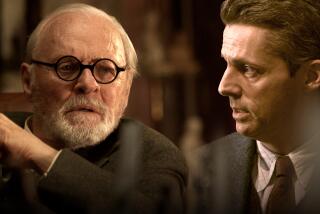‘Hitchcock’ a lifeless portrait, critics say
- Share via
For all his fame and cinematic brilliance, Alfred Hitchcock remained an enigmatic figure — prolific on the screen, private off it. The new biopic “Hitchcock,” starring Anthony Hopkins as the eponymous director and Helen Mirren as wife Alma Reville, attempts to shed some light on the master of suspense by dramatizing the making of his fabled 1960 chiller “Psycho.”
According to many film critics, however, “Hitchcock” offers more speculation than illumination and fails to bring its subject to life.
Times film critic Kenneth Turan writes that despite the film’s “major league star power … this is one cinematic portrait of a marriage we could have lived without.” Hopkins and Mirren “have their moments,” Turan says, “and the film buffs in the audience will enjoy having movie history circa 1959 come to life.” More problematically, however, “[The film’s] protagonists turn out to be not especially interesting and the audience is not presented any convincing reason to care about what happens in their lives.”
PHOTOS: The starlets of ‘Hitchcock’ and more
The New York Times’ Manohla Dargis describes “Hitchcock” as a mix of “amusing performances, historical re-creations and heavily perfumed fertilizer.” Working from a script by John J. McLaughlin based on the Stephen Rebello book “Alfred Hitchcock and the Making of ‘Psycho,’” director Sacha Gervasi is “fearlessly unsubtle,” with clumsy allusions to Hitchcock’s body of work and some shaky armchair analysis suggesting that the British auteur “was himself a little psycho and could only work from a place of madness.” Chief among the film’s diversions, Dargis says, are “Scarlett Johansson’s bodacious Janet Leigh and Michael Stuhlbarg’s wheedling Lew Wasserman.”
In a more positive review, Mick LaSalle of the San Francisco Chronicle calls “Hitchcock” “an entertaining, economical and thoroughly enjoyable glimpse into a familiar artist’s creative process.” LaSalle concedes that the movie “isn’t ambitious or complicated,” and that “There’s not enough in the writing of ‘Hitchcock’ to allow for a great performance from Hopkins, but he’s certainly game.” In the end, LaSalle says, “what saves [Hopkins] and everyone connected with the picture is that ‘Psycho’ is just so interesting and ‘Hitchcock’ commits itself to dramatizing its creation.”
Roger Ebert of the Chicago Sun-Times could have used a bit more “Psycho” and a bit less personal drama. He writes, “‘Hitchcock’ tells the story not so much as the making of the film, but as the behind-the-scenes relationship of Alma and Hitch. This is a disappointment, since I imagine most movie fans will expect more info about the film’s production history.” He adds, “This focus on Alma’s personal life is somewhat speculative and seems to have been employed … to skew the film in the direction of a ‘woman’s picture,’ of all things.” That said, “Mirren is warm and effective in the role; her intelligence crackles.”
VIDEO: What to watch Thanksgiving weekend
The Wall Street Journal’s Joe Morgenstern doesn’t mince words, calling “Hitchcock” a “lifeless botch” that “rings false from start to finish.” There is “little joy” in Hopkins’ performance, Morgenstern writes, “And no wonder, since the writing, devoid of wit let alone wisdom, reduces its subject to a little cluster of behaviors.” The end result is a “crime against biography.”
Even after all these years, it seems Hitchcock is inscrutable as ever.
ALSO:
Photos: Alfred Hitchcock: Career snapshots
Portraying the women behind the powerful men
For ‘Hitchcock’ director, a different kind of suspense
PHOTOS AND MORE
VIDEO: What to see during Thanksgiving weekend
The Envelope: Awards Insider
PHOTOS: NC-17 movies: Ratings explained
More to Read
The biggest entertainment stories
Get our big stories about Hollywood, film, television, music, arts, culture and more right in your inbox as soon as they publish.
You may occasionally receive promotional content from the Los Angeles Times.










